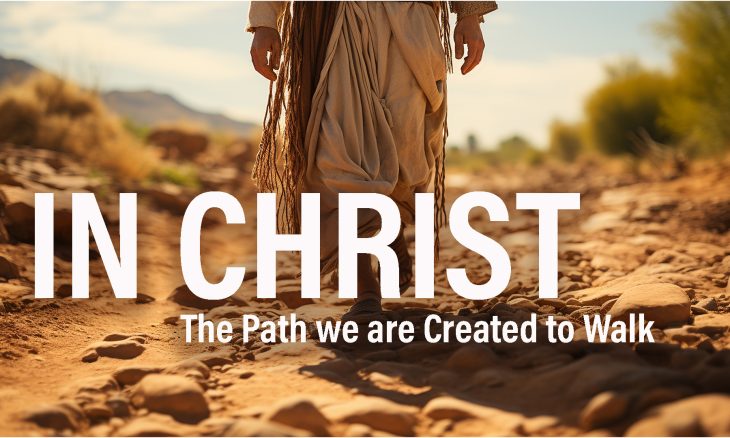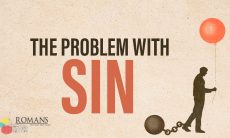In Christ, we are no longer condemned, no longer controlled by sin, no longer alone in our suffering, and never separated from God’s love.
Romans 8:1–4
There is therefore now no condemnation for those who are in Christ Jesus] 2 For the law of the Spirit of life has set you free in Christ Jesus from the law of sin and death. 3 For God has done what the law, weakened by the flesh, could not do. By sending his own Son in the likeness of sinful flesh and for sin, he condemned sin in the flesh, 4 in order that the righteous requirement of the law might be fulfilled in us, who walk not according to the flesh but according to the Spirit.
I. Therefore
Our New Position in Christ
Paul begins with one of the most hope-filled statements in all of Scripture: if you are in Christ, there is now—in this present moment—no condemnation hanging over you. God is not waiting to punish you for past sins, nor holding your failures over your head. The law could show you where you fell short, but it couldn’t set you free. Jesus did what the law couldn’t—He took your punishment so you could be declared righteous.
A. We live under grace, not guilt.
- The courtroom scene has ended—your verdict is “not guilty” because Jesus stood in your place.
- The enemy loves to whisper accusations, reminding you of your past. Grace reminds you of your position—covered in Christ’s righteousness.
- Living under grace means your relationship with God is based on His mercy, not your performance.
Imagine a debt you could never repay suddenly being canceled. The bank sends you a letter confirming your balance is zero. Would you still keep making payments out of habit? Many believers do exactly that—living under guilt instead of resting in grace.
B. Jesus took the punishment, so we don’t have to carry the shame.
- Forgiveness doesn’t just remove the penalty—it restores fellowship.
- Shame tries to define you by what you’ve done. The gospel defines you by what Jesus has done for you.
- You are not the sum of your worst moments—you are the beloved of God.
In John 8, the woman caught in adultery stood guilty before the law, but Jesus dismissed her accusers and told her to “go and sin no more.” He didn’t just remove her punishment; He restored her dignity.
C. Stop living as if you’re still on trial. You are free.
- Too many Christians live as if they’re still waiting for the verdict, always anxious about whether they’ve done enough.
- In Christ, the gavel has already fallen, and the sentence has already been served—by Him, not you.
- Freedom in Christ means you can run toward God, not hide from Him.
When guilt surfaces, remember: “There is therefore now no condemnation for me in Christ Jesus.”
Romans 8:5–13
For those who live according to the flesh set their minds on the things of the flesh, but those who live according to the Spirit set their minds on the things of the Spirit. 6 For to set the mind on the flesh is death, but to set the mind on the Spirit is life and peace. 7 For the mind that is set on the flesh is hostile to God, for it does not submit to God’s law; indeed, it cannot. 8 Those who are in the flesh cannot please God.
Heirs with Christ
12 So then, brothers, we are debtors, not to the flesh, to live according to the flesh. 13 For if you live according to the flesh you will die, but if by the Spirit you put to death the deeds of the body, you will live.
II. Therefore – New Power
Paul shifts from our position in Christ (no condemnation) to our power in Christ—life in the Spirit. God has not only declared us righteous; He has equipped us to live in a new way. The Christian life is not a matter of trying harder to be good, but of walking in step with the Spirit, who gives both the desire and the ability to obey God.
A. Two mindsets: flesh vs. Spirit
- Flesh here means our old nature—self-focused, self-reliant, resistant to God’s authority.
- Spirit refers to the new life under the influence of the Holy Spirit—God-focused, grace-fueled, surrendered to His will.
- The mind set on the flesh will lead to death; the mind set on the Spirit brings life and peace (v. 6).
- You cannot live in both mindsets at once—what you set your mind on will determine your direction.
It’s like tuning a radio. You can only listen to one frequency at a time. If your heart is tuned to the “station” of the flesh, you’ll only hear static and noise. But when you tune in to the Spirit, you hear His voice clearly.
B. The Spirit gives us both the desire and the power to obey God
- The law could tell you what to do, but it couldn’t help you want to do it.
- The Spirit changes your “wanter.” He gives you new desires that align with God’s will.
- He also empowers you to put to death the deeds of the body (v. 13)—to say no to sin and yes to God.
- Obedience is no longer about fear of punishment—it’s the joyful response of a Spirit-changed heart.
A sailboat without wind sits still, no matter how much you steer. The Spirit is the wind in our sails—He moves us forward in ways we could never accomplish by rowing harder in our own strength.
C. Are you feeding the flesh or following the Spirit? Choose your direction daily
- We are not debtors to the flesh (v. 12)—we owe it nothing. It only leads to death.
- Every day, we make small choices that either feed our sinful nature or strengthen our spiritual life.
- Walking in the Spirit is not about perfection—it’s about direction.
Ask yourself daily:
- What am I feeding—my flesh or my spirit?
- What voices am I listening to most?
- Am I making space for the Spirit to lead me today?
The Spirit-filled life isn’t just about trying harder—it’s about trusting more.
Romans 8:14–17
For all who are led by the Spirit of God are sons[a] of God. 15 For you did not receive the spirit of slavery to fall back into fear, but you have received the Spirit of adoption as sons, by whom we cry, “Abba! Father!” 16 The Spirit himself bears witness with our spirit that we are children of God, 17 and if children, then heirs—heirs of God and fellow heirs with Christ, provided we suffer with him in order that we may also be glorified with him.
III. Therefore – New Identity
Paul now moves from what we have in Christ (no condemnation, life in the Spirit) to who we are in Christ—children of the living God. This identity changes everything about how we approach Him, how we see ourselves, and how we live in the world.
A. We are led by the Spirit, not driven by fear
- Before Christ, our relationship to God was marked by fear—fear of judgment, fear of punishment, fear of never measuring up.
- The Spirit replaces that fear with guidance. He doesn’t drive us like a slave master; He leads us like a loving Father.
- Being led by the Spirit means living with the assurance that God’s direction for us is rooted in His love, not His anger.
Illustration: Picture a sheep following its shepherd. The shepherd doesn’t beat the sheep into submission—he calls, and they follow because they know his voice.
B. We are adopted into God’s family
- Adoption means you weren’t naturally born into the family, but you were chosen, wanted, and welcomed.
- God didn’t just forgive you and send you on your way—He brought you into His home.
- “Abba” is an intimate, childlike word—like saying “Dad” or “Papa.” It reflects a relationship based on closeness and trust.
In Roman culture, adoption was a legal act that gave the adopted child all the rights and privileges of a natural-born child—including inheritance. The old life was completely erased from the records.
C. We are heirs with Christ
- Being God’s child means you share in Christ’s inheritance—eternal life, glory, and God’s kingdom.
- This inheritance is secure because it depends on God’s promise, not our performance.
- Paul reminds us that being heirs also means sharing in Christ’s sufferings (v. 17). Suffering is not a sign that we’ve been abandoned—it’s part of the family journey toward glory.
If you are in Christ, you are not just forgiven—you are family.
Romans 8:18–30
18 For I consider that the sufferings of this present time are not worth comparing with the glory that is to be revealed to us. 19 For the creation waits with eager longing for the revealing of the sons of God. 20 For the creation was subjected to futility, not willingly, but because of him who subjected it, in hope21 that the creation itself will be set free from its bondage to corruption and obtain the freedom of the glory of the children of God. 22 For we know that the whole creation has been groaning together in the pains of childbirth until now. 23 And not only the creation, but we ourselves, who have the firstfruits of the Spirit, groan inwardly as we wait eagerly for adoption as sons, the redemption of our bodies. 24 For in this hope we were saved. Now hope that is seen is not hope. For who hopes for what he sees? 25 But if we hope for what we do not see, we wait for it with patience.
26 Likewise the Spirit helps us in our weakness. For we do not know what to pray for as we ought, but the Spirit himself intercedes for us with groanings too deep for words. 27 And he who searches hearts knows what is the mind of the Spirit, because[a] the Spirit intercedes for the saints according to the will of God. 28 And we know that for those who love God all things work together for good,[b] for those who are called according to his purpose. 29 For those whom he foreknew he also predestined to be conformed to the image of his Son, in order that he might be the firstborn among many brothers. 30 And those whom he predestined he also called, and those whom he called he also justified, and those whom he justified he also glorified.
IV. Therefore – New Perspective
Paul lifts our eyes from our present struggles to the eternal glory that lies ahead. Suffering is real, but it is not meaningless. In Christ, even our deepest pain is woven into God’s good purpose—to shape us into the likeness of Jesus and to prepare us for the day when all creation is restored.
A. Creation groans, we groan, the Spirit groans (vv. 22–26)
- Paul paints a picture of a world in labor pains—creation itself longs for the day when sin’s curse is lifted and God’s children are revealed in glory.
- We groan inwardly too, feeling the ache of living in bodies and a world still touched by sin, longing for our full redemption.
- The Spirit joins in this groaning, interceding for us when we don’t even have the words to pray.
- This threefold groaning reminds us that our pain is shared—by creation, by believers, and by God Himself through the Spirit.
Waiting for glory is like waiting for the birth of a child—you endure the discomfort because you know the joy that’s coming.
B. God works in all things for our good (v. 28)
- This verse is not a cliché—it’s a bedrock promise.
- “All things” includes both the blessings and the burdens of life. Nothing is wasted in God’s hands.
- His definition of “good” is not always our comfort—it’s our transformation.
- This truth allows us to live with peace even when we don’t understand the “why.”
A skilled weaver uses both dark and bright threads to create a beautiful pattern. God weaves all the events of our lives into a masterpiece that only makes sense when viewed from His perspective.
C. His ultimate goal: to conform us to Christ (v. 29)
- God’s highest purpose is not just to get us to heaven—it’s to make us like His Son.
- The process involves calling, justifying, and ultimately glorifying us (v. 30).
- Suffering is one of God’s tools to shape our character into Christ’s image.
- Knowing the end result gives us courage to trust the process.
When suffering comes, remind yourself: This is not random. My Father is at work.
Ask not just “When will this end?” but “What is God forming in me through this?”
Your pain has purpose, and your story has hope. Glory is coming, and it will far outweigh today’s suffering.
Romans 8:31–39
What then shall we say to these things? If God is for us, who can be[a] against us? 32 He who did not spare his own Son but gave him up for us all, how will he not also with him graciously give us all things? 33 Who shall bring any charge against God’s elect? It is God who justifies. 34 Who is to condemn? Christ Jesus is the one who died—more than that, who was raised—who is at the right hand of God, who indeed is interceding for us.[b] 35 Who shall separate us from the love of Christ? Shall tribulation, or distress, or persecution, or famine, or nakedness, or danger, or sword? 36 As it is written,
“For your sake we are being killed all the day long;
we are regarded as sheep to be slaughtered.”
37 No, in all these things we are more than conquerors through him who loved us. 38 For I am sure that neither death nor life, nor angels nor rulers, nor things present nor things to come, nor powers, 39 nor height nor depth, nor anything else in all creation, will be able to separate us from the love of God in Christ Jesus our Lord.
V. Therefore – No Separation
Confidence in God’s Love
Paul closes Romans 8 with a victorious declaration: if God is for us, nothing can ultimately stand against us. The God who gave His own Son for us is not about to abandon us now. No accusation can stick, no condemnation can stand, and no power—seen or unseen—can separate us from His love.
A. No charge, no condemnation, no separation
- God is the One who justifies—once He has declared you righteous, no one can reverse the verdict (vv. 33–34).
- Christ died for you, rose again, and now intercedes for you. You are not just forgiven—you are continually represented before the Father.
- No trouble, hardship, persecution, or danger can break the bond of His love (vv. 35–36).
Imagine a courtroom where your defense attorney is also the judge’s Son—He has already paid your fine, and now He stands beside you ensuring the case can never be reopened.
B. We are more than conquerors—not just survivors, but victors
- Paul doesn’t just say we “make it through”—he says we are more than conquerors (v. 37).
- This means the very things meant to destroy us are turned into instruments for God’s glory and our growth.
- Victory is not avoiding the battle—it’s emerging from it with deeper faith, unshakable hope, and a stronger grip on God’s love.
A conqueror defeats his enemy; someone who is more than a conqueror takes the enemy’s weapons and uses them for his own victory. That’s what God does with the trials in our lives.
C. Walk boldly—you are loved, secure, and never abandoned
- Paul lists every possible threat—death, life, angels, rulers, present, future, powers, height, depth—and concludes none of them can separate us from God’s love (vv. 38–39).
- The love of God in Christ is the most secure reality in the universe.
- When you know you are fully loved and eternally secure, you can live with courage and peace no matter what comes.
Conclusion:
Romans 8 opens with no condemnation and closes with no separation. In between, we are reminded of who we are, what we have, and where we’re going.
Because of Jesus, you can live free, confident, and unshakable.















